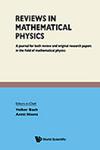一类多分量交换关系代数上的拟自由态
IF 1.4
3区 物理与天体物理
Q2 PHYSICS, MATHEMATICAL
引用次数: 0
摘要
多分量换易关系(MCR)用广义统计量描述了普克子,即多分量量子系统。在这样的系统中,准粒子的交换由一个单位矩阵Q(x_1,x_2)控制,该矩阵依赖于准粒子的位置。为了使这种交换成为可能,矩阵必须满足几个条件,包括泛函杨-巴克斯特方程。本文的目的是给出MCR代数上拟自由状态的适当定义,并构造一类MCR代数上的拟自由状态。我们观察到玻色子和费米子的经典设定与MCR代数的设定有显著的不同。我们证明了发展的理论适用于包含相反类型准粒子的系统。这种系统的一个例子是双组分系统,其中两个准粒子在交换下将各自的类型改变为相反的类型($1\ mapsto2 $, $2\mapsto1$)。准粒子融合意味着直观地将几个准粒子放入一个无限小的盒子中,并确定盒子的统计行为。通过进行如上所述的双组分系统的奇数粒子的聚变,我们获得了进一步的量子系统的例子,这些量子系统适用于所发展的理论。本文章由计算机程序翻译,如有差异,请以英文原文为准。
Quasi-free states on a class of algebras of multicomponent commutation relations
Multicomponent commutations relations (MCR) describe plektons, i.e., multicomponent quantum systems with a generalized statistics. In such systems, exchange of quasiparticles is governed by a unitary matrix $Q(x_1,x_2)$ that depends on the position of quasiparticles. For such an exchange to be possible, the matrix must satisfy several conditions, including the functional Yang--Baxter equation. The aim of the paper is to give an appropriate definition of a quasi-free state on an MCR algebra, and construct such states on a class of MCR algebras. We observe a significant difference between the classical setting for bosons and fermions and the setting of MCR algebras. We show that the developed theory is applicable to systems that contain quasiparticles of opposite type. An example of such a system is a two-component system in which two quasiparticles, under exchange, change their respective types to the opposite ones ($1\mapsto 2$, $2\mapsto1$). Fusion of quasiparticles means intuitively putting several quasiparticles in an infinitely small box and identifying the statistical behaviour of the box. By carrying out fusion of an odd number of particles from the two-component system as described above, we obtain further examples of quantum systems to which the developed theory is applicable.
求助全文
通过发布文献求助,成功后即可免费获取论文全文。
去求助
来源期刊

Reviews in Mathematical Physics
物理-物理:数学物理
CiteScore
3.00
自引率
0.00%
发文量
44
审稿时长
>12 weeks
期刊介绍:
Reviews in Mathematical Physics fills the need for a review journal in the field, but also accepts original research papers of high quality. The review papers - introductory and survey papers - are of relevance not only to mathematical physicists, but also to mathematicians and theoretical physicists interested in interdisciplinary topics. Original research papers are not subject to page limitations provided they are of importance to this readership. It is desirable that such papers have an expository part understandable to a wider readership than experts. Papers with the character of a scientific letter are usually not suitable for RMP.
 求助内容:
求助内容: 应助结果提醒方式:
应助结果提醒方式:


